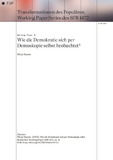Citation link:
http://dx.doi.org/10.25819/ubsi/10412Files in This Item:
| File | Description | Size | Format | |
|---|---|---|---|---|
| Manow_Wie_die_Demokratie_sich_per_Demoskopie_selbst_beobachtet.pdf | 777.51 kB | Adobe PDF |  View/Open |
| Dokument Type: | Book | metadata.dc.title: | Wie die Demokratie sich per Demoskopie selbst beobachtet | Authors: | Manow, Philip | Institute: | DFG-Sonderforschungsbereich 1472 "Transformationen des Populären" | Free keywords: | Politische Umfragen, Popularität, Parteien, Öffentliche Meinung, Demokratietheorie, Opinion polls, Popularity, Political parties, Public opinion, Democratic theory | Dewey Decimal Classification: | 320 Politik | GHBS-Clases: | OVI | Issue Date: | 2023 | Publish Date: | 2023 | Series/Report no.: | Transformationen des Populären. Working Paper Series des SFB 1472 | Abstract: | Welche veränderte Rolle spielen Umfragen in heutigen Demokratien? Welche Auswirkungen hat die routinehafte und in immer kürzeren Abständen erfolgende Ermittlung von politischen Popularitätswerten auf den politischen Prozess? Werden Umfragen zunehmend zu einem meinungsbildenden statt zu einem Meinungen nur abbildenden Instrument? Sind die in modernen Demokratien immer präsenteren Umfragen demokratietheoretisch problematisch – und wenn ja, in welcher Hinsicht? In diesem Aufsatz wird die These vertreten und empirisch plausibilisiert, dass in Zeiten abnehmender Parteibindung, Fragmentierung des Parteiensystems, stärkerer Präsenz politischer Selbstbeobachtungsinstrumente, die Popularität, positiver wie negativer, immer schnellere und umfassendere Beachtung verleihen, die Rückkopplungsschleifen von Politik und öffentlicher Meinung kürzer werden. Insgesamt vergibt sich dadurch, so die zentrale These, die repräsentative Demokratie zunehmend der Lernmöglichkeiten, die in der zeitlichen Entkoppelung zwischen der Lizensierung politischen Handelns in Wahlen und diesem Handeln selber liegen. What changed role do polls play in contemporary democracies? What effects does the routine and increasingly frequent determination of political popularity ratings have on the political process? Are polls increasingly becoming an opinion-forming instrument rather than one that merely depicts opinions? Are polls, which are increasingly present in modern democracies, problematic in terms of democratic theory - and if so, in what respects? This paper argues and empirically plausibilizes the thesis that in times of decreasing party identification, fragmentation of the party system, stronger presence of political self-monitoring instruments that give popularity, positive as well as negative, ever faster and more comprehensive attention, the feedback loops of politics and public opinion become shorter. Overall, according to the central thesis, representative democracy is thus increasingly forfeiting the learning opportunities that lie in the temporal decoupling between the licensing of political action in elections and this action itself. |
DOI: | http://dx.doi.org/10.25819/ubsi/10412 | URN: | urn:nbn:de:hbz:467-26251 | URI: | https://dspace.ub.uni-siegen.de/handle/ubsi/2625 | License: | http://creativecommons.org/licenses/by-nc-nd/4.0/ |
| Appears in Collections: | Publikationen aus der Universität Siegen |
This item is protected by original copyright |
Page view(s)
563
checked on Nov 28, 2024
Download(s)
307
checked on Nov 28, 2024
Google ScholarTM
Check
Altmetric
This item is licensed under a Creative Commons License


